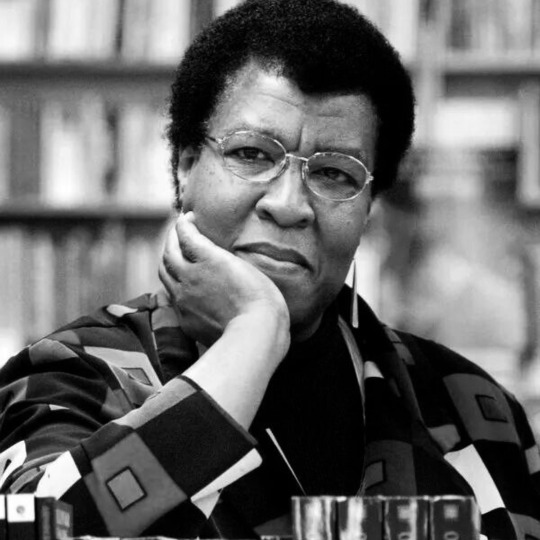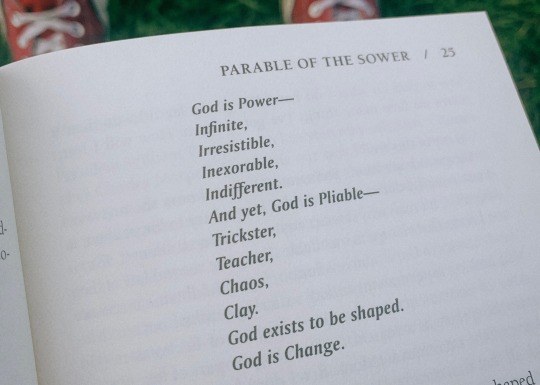#octavia e. butler
Explore tagged Tumblr posts
Text
“Choose your leaders with wisdom and forethought. To be led by a coward is to be controlled by all that the coward fears. To be led by a fool is to be led by the opportunists who control the fool. To be led by a thief is to offer up your most precious treasures to be stolen. To be led by a liar is to ask to be told lies. To be led by a tyrant is to sell yourself and those you love into slavery.” ― Octavia E. Butler
#quote of the day#quote of today#octavia e. butler#choices#leadership#widom#forethought#coward#cowardice#control#fears#fool#foolish#opportunism#thief#thievery#treasures#steal#liar#lies#tyrant#tyranny#sell#sellout#sale#love#slavery#1/20#january 2025#january 20th 2025
197 notes
·
View notes
Text
HELP
P.S. I'm gonna read them all! This is just to help me decide the order. :D
#liu cixin#rf kuang#nk jemisin#tomi adeyemi#toni morrison#nnedi okorafor#octavia butler#octavia e. butler
62 notes
·
View notes
Text





July 20, 2024, the first diary entry in Parable of the Sower.
152 notes
·
View notes
Text
Lauren Oya Olamina is truly a protagonist of all time
she's very practical, she's an empath, she's a cult leader, she's learning to draw for fun, she's making acorn bread and adopting children into her community, she's obsessed with populating interstellar space even as societal order is collapsing, she's writing the bible but this time it's about how diversity and change are central to a thriving society, she's stocking up on weapons and caching supplies, and she's like twenty... no one is doing it like her
#earthseed#parable of the sower#parable of the talents#octavia butler#octavia e. butler#lauren olamina#lauren oya olamina#octavia#olamina#books#science fiction#dystopian books
324 notes
·
View notes
Text
In order to rise
From its own ashes
A phoenix
First
Must
Burn.
-Octavia E. Butler, Parable of the Talents, 1998
93 notes
·
View notes
Text

“Sometimes I wrote things because I couldn’t say them, couldn’t sort out my feelings about them, couldn’t keep them bottled inside me.”
— Octavia E. Butler, “Kindred”
#octavia e. butler#octavia butler#literature#lit#literature lover#literature quote#literature quotes#english literature#philosophy#philosophical#philosopher#philosophers#philosophy quotes#philosophy of life#quote#quotes#excerpts#excerpt#quoteoftheday#booklover#book#bookworm#books#book quotes#book quotations
195 notes
·
View notes
Text
In order to rise From its own ashes A phoenix First Must Burn.
Parable of the Talents by Octavia E. Butler
57 notes
·
View notes
Text



“There is no power in having strength and brains, and yet waiting for God to fix things for you or take revenge for you.”
- Octavia E. Butler, Parable of the Sower
#my photos#midwest#indiana#rural america#american gothic#abandoned#americana#midwest gothic#southern gothic#parable of the sower#octavia e. butler#god is CHANGE#regional gothic#small town america
298 notes
·
View notes
Text
Reminder:

8 notes
·
View notes
Text

Title: Parable of the Talents | Author: Octavia E. Butler | Publisher: Seven Stories Press (2016)
6 notes
·
View notes
Text
Habits were difficult to break. The habit of living, the habit of fear … even the habit of love.
Octavia E. Butler, Wild Seed (1980)
31 notes
·
View notes
Text
Giving this its own post because I feel like it. Here's the original reply version for context.
Not sure if you read the third book yet but that sort of makes it clearer.
The whole fear that their children “won’t be human anymore” is more a fear of eugenics, reflecting the historic trend of white colonizers coming in and purposefully trying to “breed out” the genetics, history, and culture of native people by making sure that they couldn’t have kids with each other or even grow up learning about their culture, which is exactly what the Oankali are doing.
They’ve made it literally impossible for humans to have kids without their explicit eugenicist intervention, which will always ensure that the kids are less human than their parents.
It’s a form of eugenics and genocide, with the ultimate goal being that humans are completely subsumed within the Ooankali and cease to exist except for a few traces of DNA that will be used to colonize the next planet and the people who live there.
“Human” here represents everything that makes these people the victims of colonization, rather than just being a species designation. When genocidal eugenicist aliens appear out of space, everyone on the planet becomes the colonized, and “human” becomes a minority status that has to be defended to the nail when the explicit goal of the aliens is to make humans cease to exist.
It’s not about not wanting kids to be disabled, because that is explicitly what the Oankali do. And there’s a difference between interracial marriage and purposeful forced eugenics.
#Rjalker reads Xenogenesis#Xenogenesis#Octavia E. Butler#Octavia Butler#Lilith's Brood#Eugenics#genocide#colonization#consent
21 notes
·
View notes
Text


JOMP Book Photo Challenge / November / 7 / non-white author
My all-time favourite science fiction trilogy by Octavia E. Butler.
#justonemorepage#jompbpc#book photo challenge#octavia e. butler#xenogenesis trilogy#dawn#adulthood rites#imago#lilith#science fiction#literature#literature blog#literature lover#aesthetic#aesthetic photography#studyblr#books and reading#book blog#bibliophile
16 notes
·
View notes
Text
…TV and movies advertise killing as a very easy thing—how simple to blow somebody away. If it is that easy it shouldn’t be, and I didn’t want my character to be someone who felt the need to murder somebody.
Octavia E. Butler on writing Kindred (1979), interviewed by Frances M. Beal for The Black Scholar (1986)
#black studies#octavia e. butler#speculative fiction#black sci-fi#kindred#the black scholar#black women writers
11 notes
·
View notes
Text
Octavia E. Butler's lost works
"There's much more to her career than the dozen or so books we know; out of the spirit of brutal perfectionism that drove her, she held a lot of interesting and worthy work back. I've talked a lot about the treasures of the Huntington in these pages: the unpublished Blindsight, "Evening" [1] and Paraclete; the many Tricksters; the alternative Xenogenesis, the lost short stories and essays and sequels and interviews and plays. This material should not be left only to the small number of scholars who are able to make their way to the Huntington; much of it can see, and deserves to see, publication. These are not discarded scraps or abandonded, embarrassing mistakes; it's just more.
Butler's incredible productivity, coupled with her intense self-criticism, self-censorship, and perfectionism, has conspired to create a vast intertextual hidden archive of alternative versions and lost tales that will, I hope, reinvigorate the study of her work as more scholars are able to get to the Huntington and as more of it trickles out in published form."
From Gerry Canavan's biography of Octavia E. Butler in the Modern Masters of Science Fiction series
#octavia butler#octavia e butler#Octavia E. Butler#I am once again asking you to release the butler archives#star trek fanfiction#parable of the trickster#earthseed#books#Xenogenesis#lilith's brood#so much more#this biography was also a great peek at the underwater part of the iceberg of her work so to speak#gerry canavan#science fiction
53 notes
·
View notes
Text
To survive, Know the past. Let it touch you. Then let The past Go.
-Octavia E. Butler, from "Earthseed: The Books of the Living," Parable of the Talents
156 notes
·
View notes